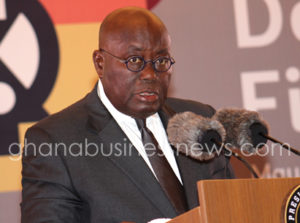President Akufo-Addo roots for participatory governance

President Nana Addo Dankwa Akufo-Addo, is optimistic that Ghana’s commitment to pursue accountable and transparent democratic governance, especially at the local level would lead to accelerated growth.
He said the success of any government in the implementation of its development agenda, to a large, depended on a well-orchestrated participatory governance.
“If the central government functions well, it means the local government is working,” President Akufo-Addo, an ardent advocate for the rule of law, noted.
He was addressing a training programme of the Ministry of Local Government and Rural Development (MLGRD) in Kumasi.
This was part of the itinerary on his three-day working visit to the Ashanti Region, to inspect on-going development projects and also interact with the chiefs and people.
“A local governance system that brings on board all identifiable stakeholders in the decision-making processes, project planning and implementation, is the way the nation should go to enhance the wellbeing of the people,” he said.
The training programme brought together Metropolitan, Municipal and District Chief Executives (MMDCEs), and key players in the decentralized local government system, to discuss development issues.
It also looked at the proposed reforms to deepen accountable governance through the election of MMDCEs, which is intended to modify the current constitutional mandate authorizing the President to nominate them and transfer that prerogative to the citizenry.
Ghana had since 1992 under the Fourth Republican Constitution, embraced the local governance system, prosecuting its development agenda through the decentralized departments.
This system had over the years been adopted and replicated in some African countries, serving as the model for the governance of their people.
President Akufo-Addo emphasized that allowing the citizenry to choose their own MMDCEs vis-a-vis the existing practice which limited that responsibility to the local assemblies, would initially come with its own challenges and friction.
“However, we should find a way to co-exist,” he advised, and drew inferences from scenarios and practices in countries such as South Africa and Kenya, where the choice of MMDCEs lied solely with the electorate.
“You do not govern without the concern of those governed,” President Akufo-Addo stated, stressing that it was necessary to entrench accountability in the nation’s political endeavours.
“It is a progressive step we are taking to further modernize our democracy. It is a moment of history for us,” the President noted.
Hajia Alima Mahama, Minister of Local Government and Rural Development, pointed out that the local assemblies played a critical role in the nation’s course of development.
It is, therefore, the vision of the central government to inject efficiency in the work of the local government to help meet the needs of the people.
Source: GNA
